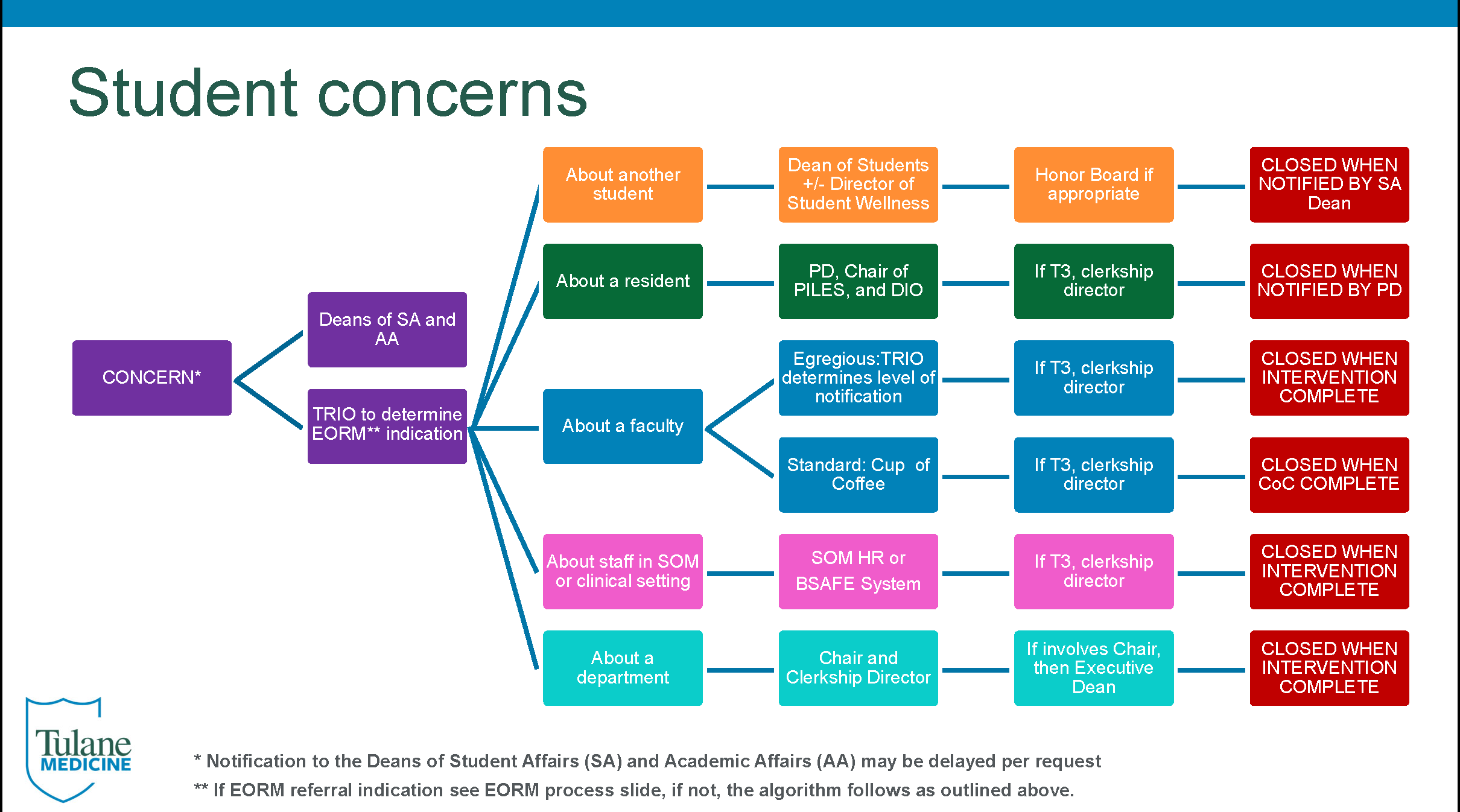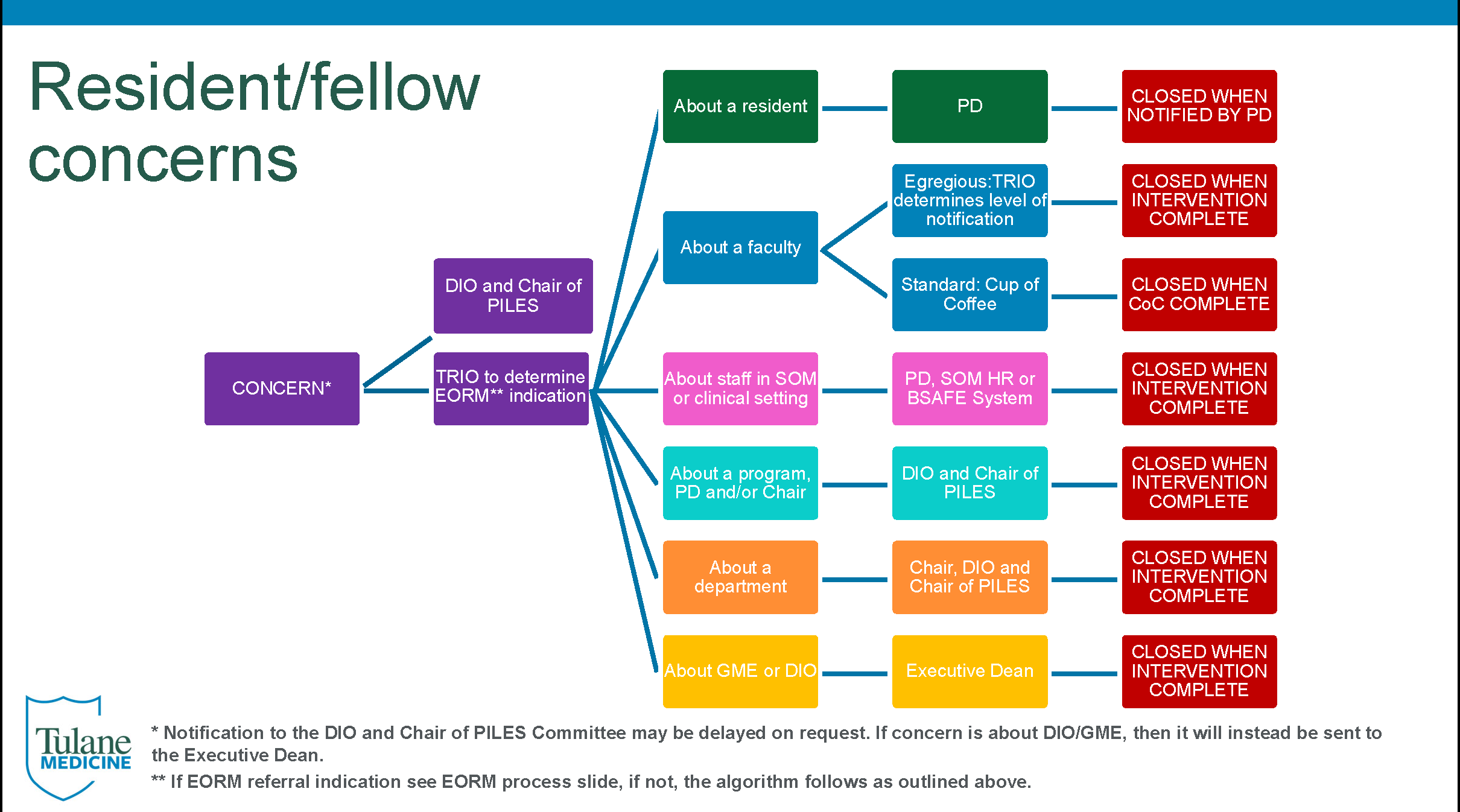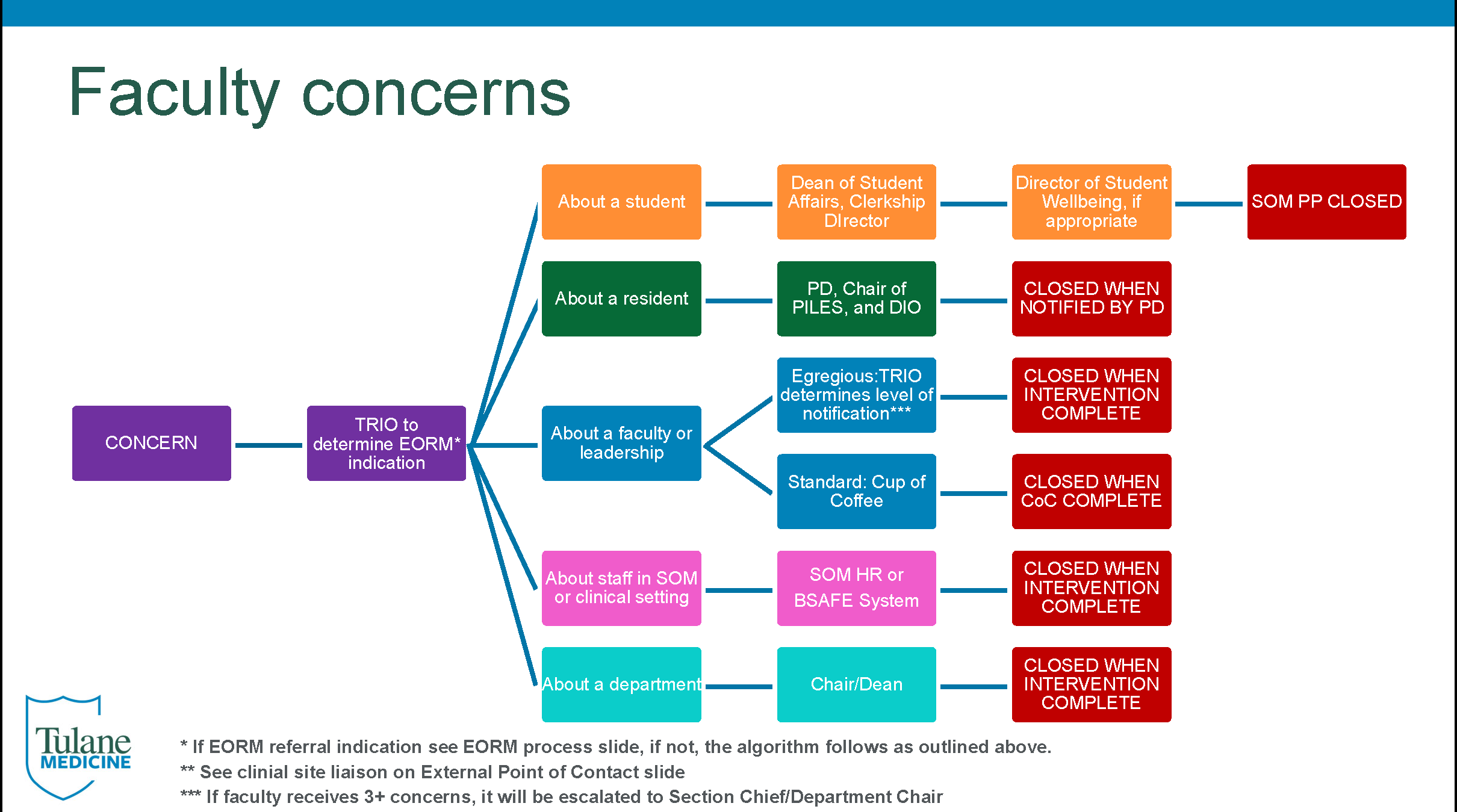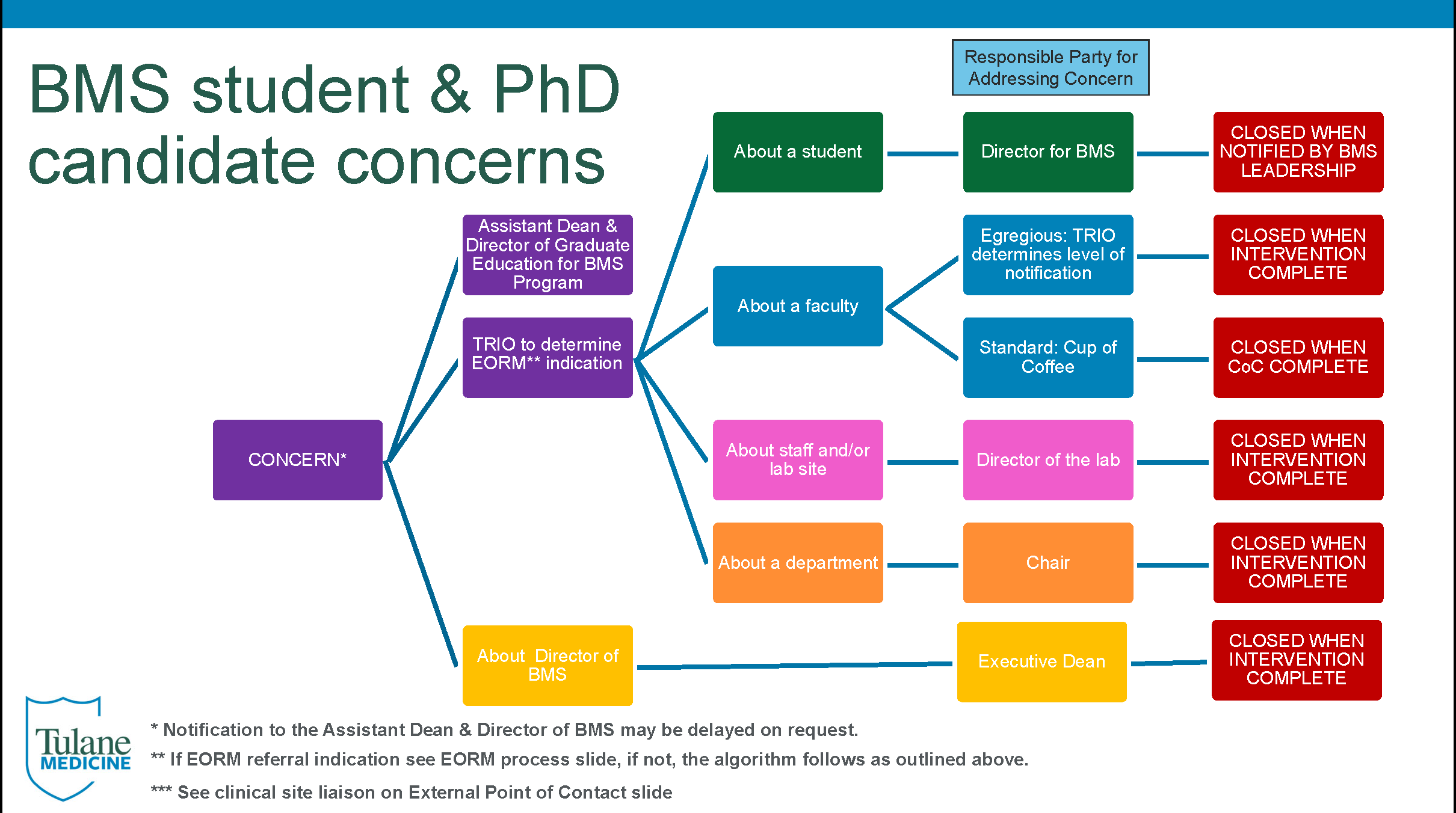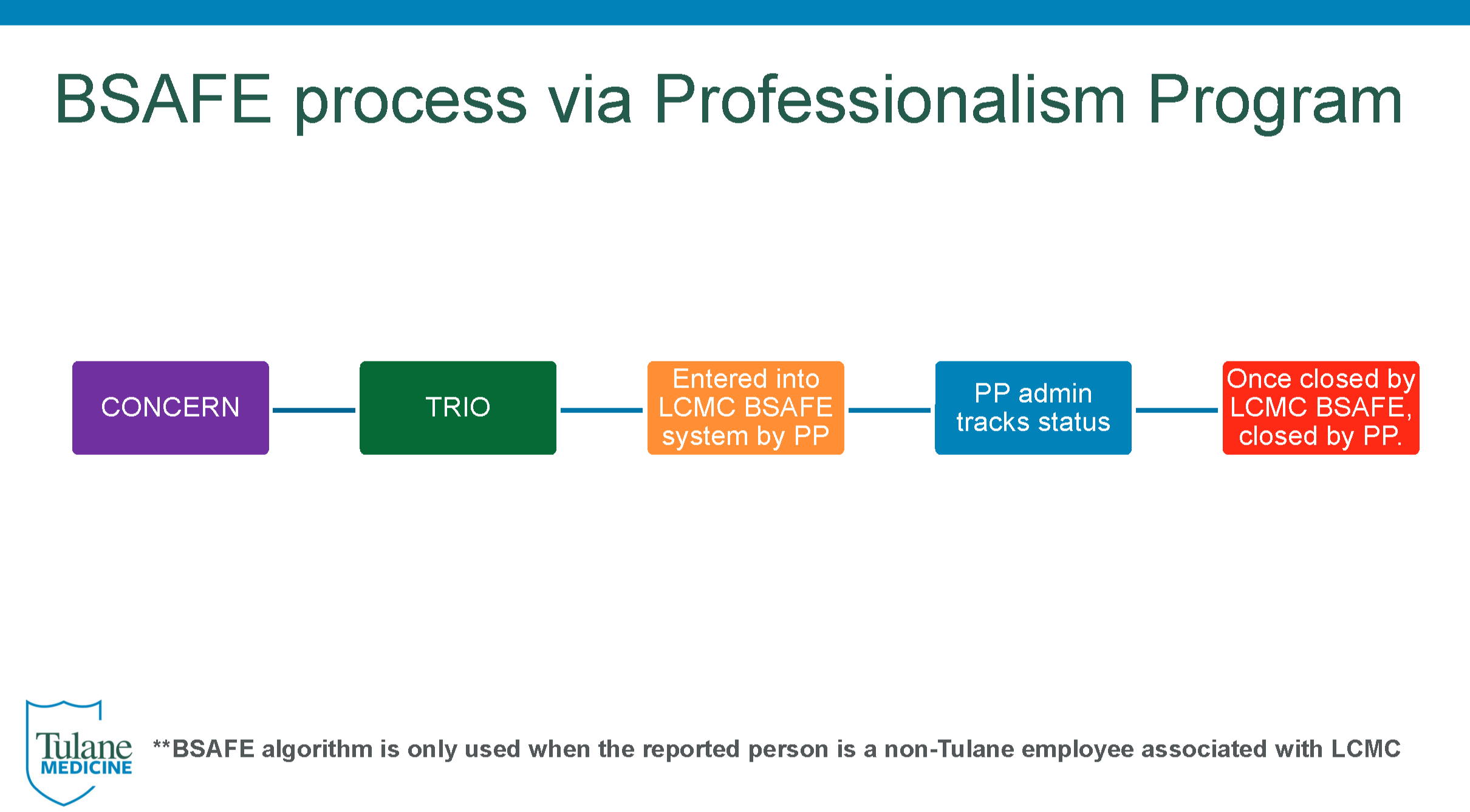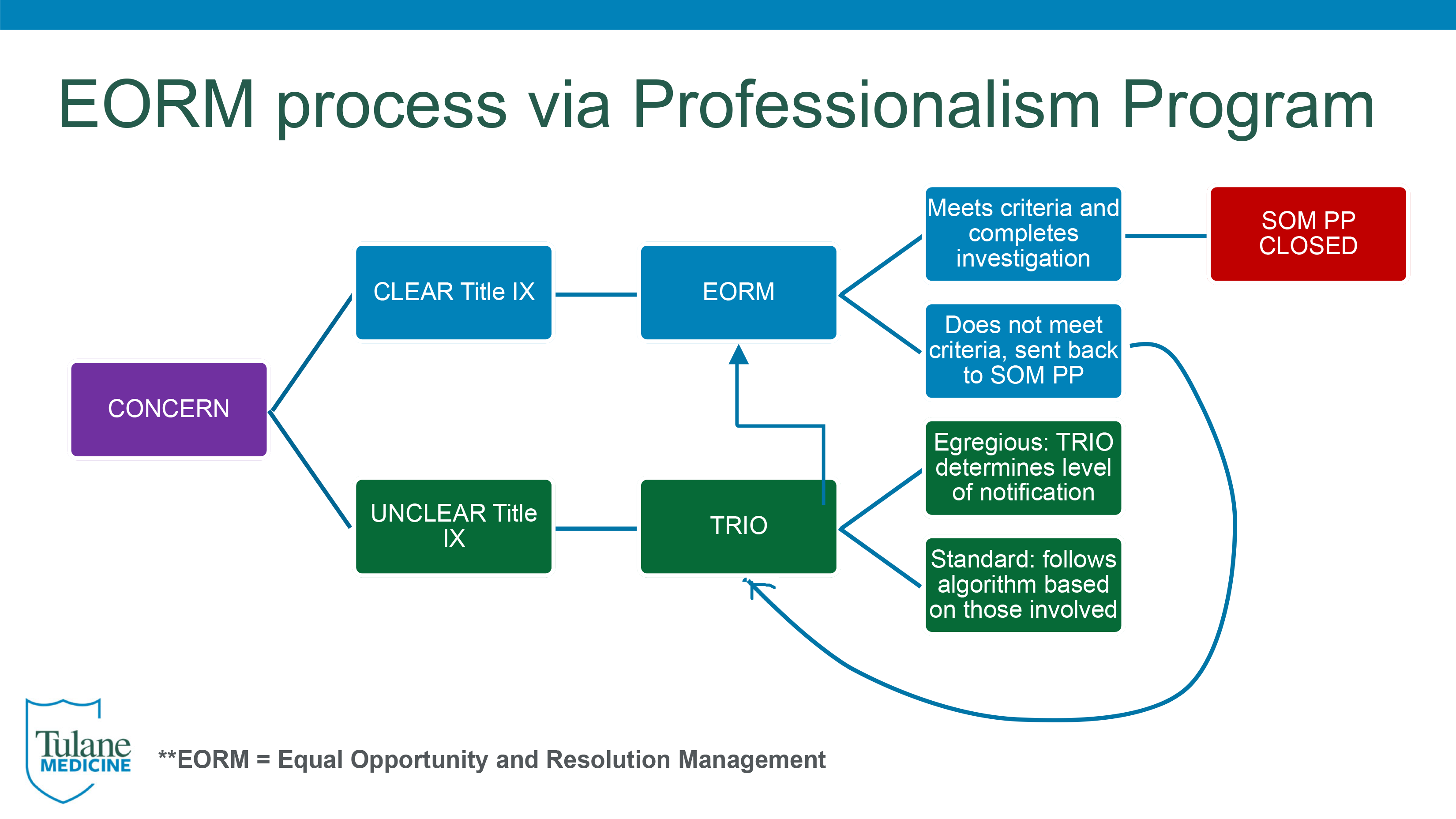Scope
A comprehensive program for both facilitating a professional environment and providing a system to collect and track all reports to ensure accountability and follow-through.
Purpose
The Tulane University School of Medicine (SOM) is committed to creating and maintaining a positive and respectful environment for its faculty, learners and staff by holding accountable those who do not follow the tenets of professional workplace behavior. The SOM Guiding Principles outline our prioritized core values and link them to behavioral expectations. Each year, all members of our community will acknowledge receipt of these principles. An emphasis has been placed on recognizing those individuals with exemplary behavior and who are role models for professionalism.
The Professionalism Program is designed to facilitate the creation and maintenance of an environment that is professional, respectful, inclusive, and intellectually stimulating. The Professionalism Program allows individuals to both recognize exemplary behavior as well as submit concerns about all aspects of the learning environment.
The program receives all concerns, which can be submitted through a variety of mechanisms, and documents and records them in a confidential database. Each report is reviewed and managed following established algorithms, approved by the Professionalism Program Advisory Board. An essential assumption is that all members of our community do not intend harm, rather may need education and awareness of the impact of their actions. Thus, early intervention is key to prevent continued or escalated unprofessional behavior.
Goals
1. Promote and facilitate a professional and inclusive learning/work environment based on our Guiding Principles.
2. Provide a clear and easy process to acknowledge those who exemplify the SOM Guiding Principles and role-model professionalism.
3. Provide consistent educational opportunities for all members of our community.
4. Provide a clear and transparent process for reviewing and resolving all concerns of unprofessional behavior.
5. Ensure confidentiality and minimize fear of retaliation.
6. Facilitate a fair system to ensure accountability of all members of our community.
7. Build and maintain trust by making available all relevant aggregated data and metrics to ensure the integrity of the program.
8. Provide oversight to ensure resources are provided to units with recurrent concerns.
Reporting of Exceptional Behavior: How to Report
Exemplary treatment of a learner or any member of the learning environment, either experienced or witnessed, can be reported utilizing the Kudos Form.
The “10 Owls” Society
Exemplary behavior is essential for the growth of a more accountable, professional environment. Therefore, those who have received 10 or more exceptional reports will be recognized by the Dean and inducted into the 10 Owls Society.
Reporting of Concerning Behavior: How to Report
*Please note that this reporting mechanism (concern form) should not be used to report behavior related to an individual’s personal medical visit or include any health information.
For students, residents or faculty:
Perceived inappropriate treatment of a learner or any member of the learning environment, either experienced or witnessed, should be reported by one or more of the following methods:
- In writing utilizing the Professionalism Concern Form. If the incident involves perceived harassment or discrimination, the reporter should select the Tulane University Campus Reporting Form link to send the report directly to the Title IX Coordinator and/or the Equal Opportunity and Resolution Management (EORM) as required by federal law. Reports submitted to the Professionalism Program that are deemed to include harassment or discrimination will be forwarded to EORM.
- When submitting a concern, you will be asked to select a B-SAFE category from a list. You can find the categories and definitions here.
For students only:
In addition to the methods listed above, students have the opportunity to report perceived concerning behavior by one or more of the following methods:
- Verbally or in writing to the course or clerkship director of the learner’s course. The Professionalism Program encourages students to report concerns directly. However, after discussing concerns with students, course/clerkship directors are encouraged to submit a Professionalism Concern Form. This will allow for entering of the concern into the tracking database and initiation of the review process.
- On end‐of‐course and clerkship evaluations. All student evaluations include a link to the Professionalism Program reporting form so that students may report concerns directly to initiate the review process. Students have the option to delay review of the report to eliminate concerns regarding potential retaliation being reflected in their grade for the course or clerkship.
The School and the University will keep confidential all records of complaints to the extent permitted by law. Note that behaviors that violate Title IX of the 1972 Education Amendments to the Higher Education Act, which includes discrimination or harassment based on sex or gender, must be reported by any University official so they can be promptly acted upon in compliance with federal law. If a report suggests discrimination, the School is required to notify the University’s Equal Opportunity and Resolution Management Office so that an investigation may be initiated. Required notification also includes behaviors that pose an imminent danger to others (e.g., violence or threats of physical violence, illegal drug use by caregivers in the clinical setting, deliberate violation of patient safety procedures) or are illegal (e.g., stealing narcotics, falsifying patient records) and must be reported immediately (possibly TUPD) so that action can be taken.
All concerns that don’t meet the criteria for immediate reporting will be confidential, within the confines of the stated algorithms (see Review of Reports of Concerning Behavior). In most instances, this will be limited to the Program Administrator, who will redact the reporter’s name from the TRIO review as well as any other party that is automatically identified, in the case of learners. We therefore encourage you to include your name so that we can request further detail if needed. If a report is made anonymously, the concern will be reviewed and addressed based on the information provided, which may be limited. Full disclosure of the persons involved, and the behaviors witnessed, can lead to more effective action to address the concern.
Of note, any learner who reports inappropriate behavior may request a delayed review of their concern until after grades and/or evaluations have been completed. The process will include an initial review by the Program Administrator to assess for required reporting. Then, following the requested delay, the concern will be reviewed by the TRIO and sent to the appropriate parties identified for notification. Please note, however, that time delays in addressing an incident may lessen the impact of the intervention.
Protection of Rights of those Reporting Concerning Behavior
The success of the Professionalism Program in safe‐guarding the learning environment depends on the timely reporting of incidents of inappropriate treatment. In all cases, retaliation, or the encouragement of another to retaliate against the person making such a report will be considered a breach of professionalism and will be addressed accordingly.
Protection of the Rights of those Reported for Concerning Behavior
*Please note that this reporting mechanism (concern form) should not be used to report behavior related to an individual’s personal medical visit or include any health information.
Intentional false or malicious reports of concerning behaviors will not be tolerated and will be handled as a disciplinary matter in the learner’s program. All reports of concerning behavior will be handled confidentially, with the exceptions noted above, and in a manner that affords due process.
Review of Reports of Concerning Behavior
All reports will be reviewed by the TRIO and triaged using the established professionalism protocols for intervention. If requested by the individual reporting, the timing of a review can be adjusted or delayed to relieve fear of intimidation or retaliation. However, if the concern involves behavior that suggests a violation of Title IX or imminent danger, the report will be referred to the Equal Opportunity and Resolution Management Office without delay. We encourage all reports to be as detailed as possible to allow for a complete review.
Processes for review and follow up will vary depending upon the situation and are summarized as follows:
1. Reports made by Student Learners* about:
*All reports involving students will be shared with the Dean of Student Affairs and Dean of Academic Affairs. For concerns submitted about a medical student, the Dean of Student Affairs is expected to conduct the review and provide intervention.
*Student reports regarding non-Tulane physicians will be sent to the Clerkship Director. If 3+ regarding the same physician and there continues to be an issue after Clerkship Director addresses, expectation is the physician would be removed from their teaching role. If the circumstances do not allow for removal and concerns persist, concern will be sent to the Assistant Dean for Clinical Education to address.
2. Reports made by Resident Learners* about:
*All reports involving residents/fellows will be shared with the Chair of the GME PILES Subcommittee, as well as the DIO.
3. Reports made by Faculty about:
*For Medicine faculty members, if a faculty member receives 3+ non-egregious concerns, the concern will be escalated to the Section Chief. If 4+, then the Section Chief and Department Chair will address. If greater than 4, the Section Chief, Department Chair, and the Dean will address.
*For non-Medicine faculty members, if a faculty member receives 3+ non-egregious concerns, the concern will be escalated to the Department Chair. If 4+, then the Department Chair and the Dean will address.
4. Reports made by BMS & PhD students* about:
*All reports involving BMS & PhD students will be shared with the Assistant Dean of BMS as well as the BMS Director.
5. Reports made about a faculty member by non-trainees: The TRIO will determine the level of offense and proceed by using the established professionalism remediation protocol for intervention. If the first offense and not egregious in nature, the TRIO will assign to a peer messenger. If not the first offense, the report may be escalated following the Pyramid for Graduated Intervention and the TRIO may also notify the appropriate Chair and if needed, the Dean. A resolution report is expected to be returned to the TRIO and Program Administrator.
6. Reports made about the Dean of the School of Medicine or other senior SOM administrators: The TRIO will determine the level of offense and proceed using the established professionalism remediation protocol for intervention. The TRIO will assign professionalism concerns reported about the Dean of the SOM to the University Provost/Senior Vice President for Academic Affairs or the President of the University. Concerns reported about other senior administrators will be assigned to the Executive Dean to address. A resolution report is expected to be returned to the TRIO and Program Administrator.
7. BSAFE Process
When the Professionalism Program receives a concern about someone associated with LCMC Health but not employed by Tulane School of Medicine, the concern will be shared with the Professionalism Program TRIO, and if agreed upon, will be entered into BSAFE for the hospital's External Points of Contact to address. The Professionalism Program will then monitor the report's status until it is officially closed.
8. EORM Process
In all cases, the party responsible for addressing the concern will formally notify the Professionalism Program Administrator that the intervention is complete. The person who reported the inappropriate treatment, if identified, will be notified that action has been taken on the report. Specific details of any action may not generally be revealed.
Reporting and Assessment of the Environment of Learning
On a quarterly basis, a de-identified summary will be presented and reviewed by the Professionalism Advisory Board. An overall summary will be published quarterly for all learners and faculty on the Professionalism/Environment of Learning Program website. A timely review will allow for early intervention for those individuals with recurrent issues. The tracking will include a 36-month calendar year trend.
